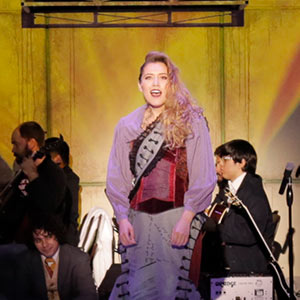Pulitzer-Prize winning play to be performed at FO
— Fullerton College Hornet - Cindy Kim - Monday, April 24th, 1995
"Picnic," the Pulitzer-Prize winning play by William Inge, will open April 27 in the Bronwyn Dodson Theater.
The comedy-drama is about a not very bright college football player turned tramp.
His arrival to a small Kansas town on a hot Labor Day disrupts the lives of a handful of women who find themselves both attracted and repelled by the ruggedness of a crude kind of masculinity they had never before encountered.
The prettiest girl in town suffering from numbness and dumbness realizes an ardor never known before.
Her mother fights to keep her daughter from throwing her life away.
Other women affected by the flakish athlete are a young tomboyish ugly duckling undergoing a painful teenage awakening, a spinsterish school teacher and an elderly, selfless neighbor who makes the mistake of giving him a handout.
Inge's play was a major hit when it was first presented in February of 1953 in New York.
It ran for 61 weeks and then toured most of the other larger American cities after being awarded the Pulitzer Prize for the 1952-53 theatrical season, the Drama Critics' Circle Award, the Outer-Circle Award and the Theatre Club Award as the best play of the year.
"Picnic" was one of Broadway's greatest successes during the 1953 and 1954 seasons.
It was released in 1955 as a film starring William Holden, Rosalind Russell and Kim Novak.
In 1986 it was remade for cable television starring Gregory Harrison and Jennifer Jason Leigh.
Inge's maxim in making bright colors glow is to juxtapose them with dark colors, as apparent in the comedy.
Before the opening of "Picnic" in New York, Inge commented on his reason for bringing in a man into the mostly-women casted play.
"I wanted to do a group portrait of an assortment of women in 'Picnic,"' Inge said. "But I soon discovered that if you want to study women, you've got to bring in a man. "That way you get the strongest feminine reactions," continued Inge.
"To stir up the women, I brought in a brash young hoodlum, scarcely more than a tramp but exuding animal vitality."
"The various reactions of the women to him posed them for their portraits."
Inge formerly wrote as' a dramatic critic for the St. Louis Star Times.
His first stage success was "Come Back, Little Sheba," which was also later made into a movie.








